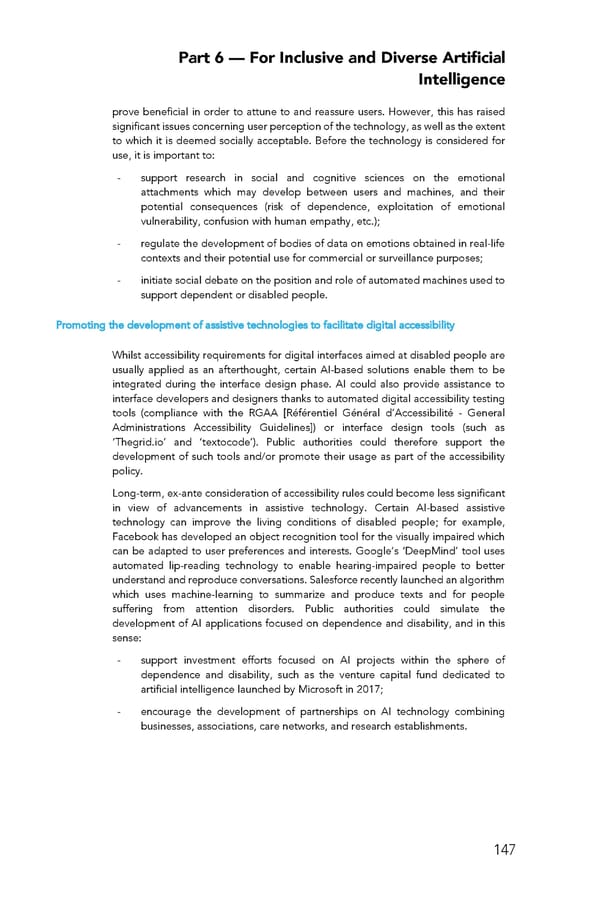Part 6 — For Inclusive and Diverse Artificial Intelligence prove beneficial in order to attune to and reassure users. However, this has raised significant issues concerning user perception of the technology, as well as the extent to which it is deemed socially acceptable. Before the technology is considered for use, it is important to: - support research in social and cognitive sciences on the emotional attachments which may develop between users and machines, and their potential consequences (risk of dependence, exploitation of emotional vulnerability, confusion with human empathy, etc.); - regulate the development of bodies of data on emotions obtained in real-life contexts and their potential use for commercial or surveillance purposes; - initiate social debate on the position and role of automated machines used to support dependent or disabled people. Promoting the development of assistive technologies to facilitate digital accessibility Whilst accessibility requirements for digital interfaces aimed at disabled people are usually applied as an afterthought, certain AI-based solutions enable them to be integrated during the interface design phase. AI could also provide assistance to interface developers and designers thanks to automated digital accessibility testing tools (compliance with the RGAA [Référentiel Général d’Accessibilité - General Administrations Accessibility Guidelines]) or interface design tools (such as ‘Thegrid.io’ and ‘textocode’). Public authorities could therefore support the development of such tools and/or promote their usage as part of the accessibility policy. Long-term, ex-ante consideration of accessibility rules could become less significant in view of advancements in assistive technology. Certain AI-based assistive technology can improve the living conditions of disabled people; for example, Facebook has developed an object recognition tool for the visually impaired which can be adapted to user preferences and interests. Google’s ‘DeepMind’ tool uses automated lip-reading technology to enable hearing-impaired people to better understand and reproduce conversations. Salesforce recently launched an algorithm which uses machine-learning to summarize and produce texts and for people suffering from attention disorders. Public authorities could simulate the development of AI applications focused on dependence and disability, and in this sense: - support investment efforts focused on AI projects within the sphere of dependence and disability, such as the venture capital fund dedicated to artificial intelligence launched by Microsoft in 2017; - encourage the development of partnerships on AI technology combining businesses, associations, care networks, and research establishments. 147
 For a Meaningful AI - Report Page 145 Page 147
For a Meaningful AI - Report Page 145 Page 147